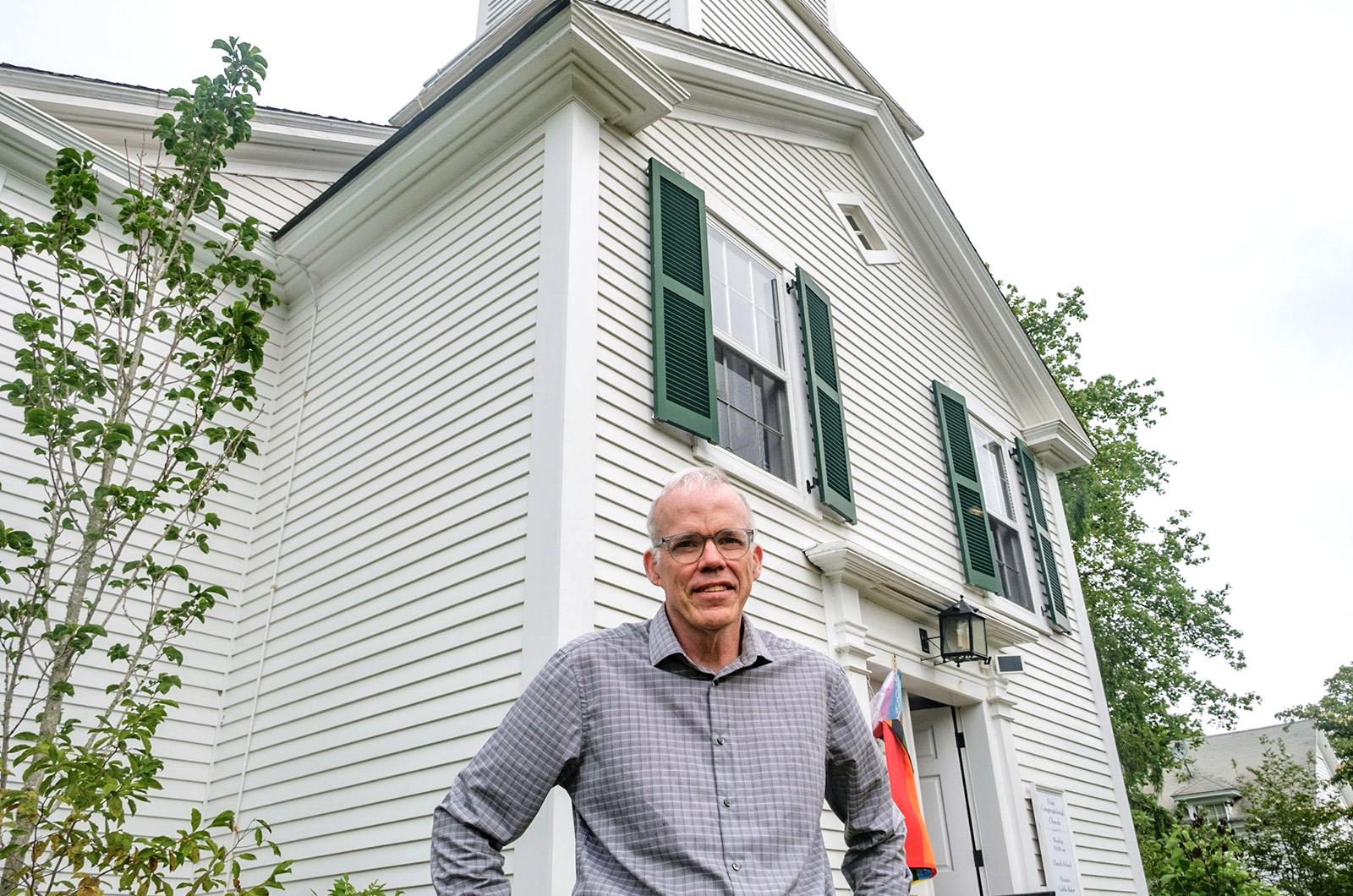On Tuesday, July 4, when the Earth reached its hottest average global temperature in over 125,000 years, Bill McKibben said he could not help but feel his life’s dedication to climate activism has been futile. Then, just days later, he watched as 10 inches of rain cascaded onto the mountains around his home in Vermont, and collected in a flood that ravaged the state and washed away his neighbor’s house.
Climate change was at his door, and in that moment, the planet appeared irreparable.
But on Sunday, July 16, Mr. McKibben stood at the pulpit of the First Congregational Church of West Tisbury and preached about hope and resilience in the face of the climate crisis. Reinvigorated, he urged the audience to take action and reject any beliefs that the Earth is beyond saving.
In an interview with the Gazette before Sunday’s service, Mr. McKibben reflected on his career in environmental advocacy, the connection between science and religion and how he copes with the tragedies of a changing climate.
“This has been a rough and revealing couple of weeks,” he said, seated in the church office of Rev. Cathlin Baker. “I sort of feel as if the warning I’ve been giving for 35 years was [about] what was going to happen the first week of July . . . But there’s still an immense amount of more work to do to keep it from getting any worse than it has to get.”
Mr. McKibben has felt drawn to nature since childhood, when his family spent one week every summer vacationing in Aquinnah, known to him then as Gay Head.
“It was the best week of the year,” he said. “I haven’t been back here for almost half a century... but some part of me has always remembered this place. I’ve already played in the waves.”
He committed his life to environmentalism shortly after the election of President Ronald Reagan in 1980, and has since authored more than a dozen books. His first, titled The End of Nature and published in 1989, is widely considered to be the first book about climate change written for a general audience.
“When I started writing about this 35 years ago, my hope was that people would read my book and change,” he said. “But that’s not how change, I guess, really happens when you have a determined opponent on the other side.”
But change is possible, he said, when there are accessible opportunities for people around the world to gather and exchange ideas about climate action. In 2008, Mr. McKibben co-founded 350.org, a global grassroots campaign that has successfully organized climate demonstrations in every country except North Korea.
“It was really the first kind of iteration of a global climate movement,” he said. “We’ve learned a lot of lessons about how people in different places do their organizing. There are different vocabularies for [climate change] in all the different parts of the world.”
Now, Mr. McKibben is trying to recruit one particular group of people who he said have been noticeably absent from the movement.
“I’ve been working with mostly young people for decades now, because that’s who’s been doing most of the work,” he said. “But if you want to influence Washington or Wall Street or Beacon Hill, it is good to have some people with hairlines like mine engaged in this operation.”
To rally his peers, Mr. McKibben recently founded Third Act, an environmental campaign for people ages 60 and over. In March, members of the group sat in rocking chairs outside Chase and Wells Fargo banks in Washington D.C. to protest the banks’ funding of new fossil fuel infrastructure. The press dubbed it the “rocking chair rebellion.”
The idea, said Mr. McKibben, is to show people from older generations that participation in the decarbonization movement is possible at any age, and to eradicate the belief that climate change is a problem to be solved only by young people.
“Young people have extraordinary intelligence, energy and idealism, but they don’t yet have much structural power to make change in the short time that we have,” he said. “The one group with a lot of structural power? Old people.”
Mr. McKibben has visited several churches to speak about climate change and promote Third Act. To him, there’s a distinct and undeniable relationship between science and faith.
“Science by itself can provide us with understanding and with solutions, but it can’t provide us with the will to go and do the work to make things happen,” he said. “That’s where ethics and moral and religious sense can be very helpful.”
During his sermon Sunday on the Book of Job, he contemplated the changing power dynamic between humans and God. At one time, he said, it was believed that only God could control the weather and the sea. Today, humans can, too.
When rains pour down, wildfires rage and optimism is hard to conjure, Mr. McKibben said he wanders into the woods and finds solace in the natural environment. There, he regains the spirit to continue his fight for the planet and its people.
“I feel [hopeless] often, especially at night,” he said. “But I try to remind myself that damaged, though it is, it remains a very beautiful planet. One of our jobs is to simply bear witness to that.”
For information about becoming a member of Third Act, visit thirdact.org.




Comments (1)
Comments
Comment policy »